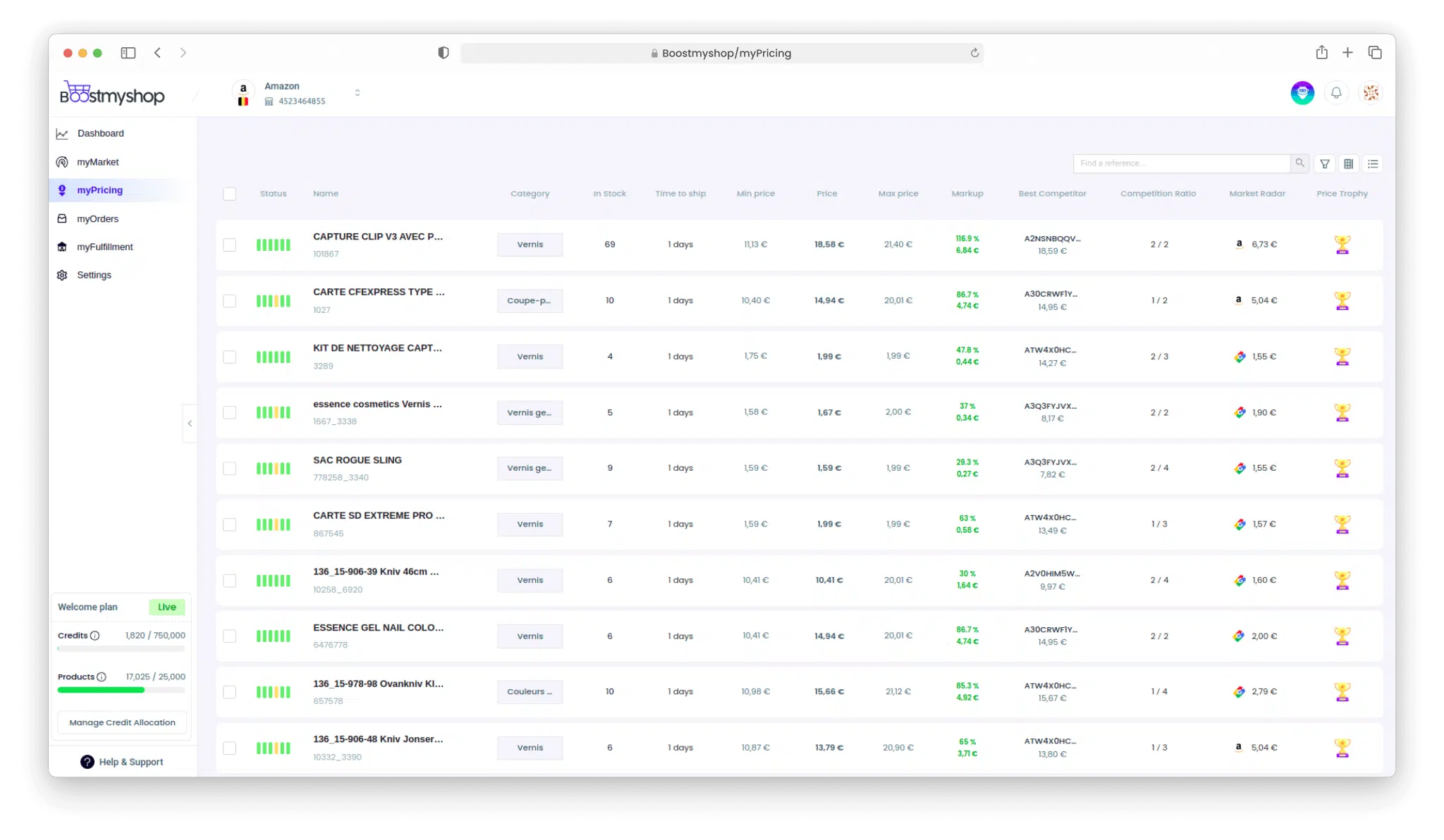Matching Products Across Marketplaces: A Beginner’s Guide
How Does Product Matching Help Your Ecommerce
According to a report by Statista, global e-commerce sales are projected to surpass $8 trillion by 2026, with multi-channel sellers outperforming single-channel retailers by 190% in revenue. This staggering growth highlights the importance of efficient product matching strategies to stay competitive and maximize profits.
Imagine this: you’ve dedicated countless hours to perfecting your online store. Your product selection is thoughtfully crafted, descriptions are detailed and engaging, and your images are visually stunning. Yet, despite all this effort, your products remain hidden amidst the sea of online listings.
This is a common challenge for many e-commerce entrepreneurs. With new items flooding marketplaces daily, standing out becomes increasingly difficult. Shoppers looking for that ideal pair of running shoes may find themselves lost in a labyrinth of nearly identical options, never discovering your product. Product matching is designed to address precisely this issue.
Product matching, the process of identifying and linking identical or similar products across different online platforms, is crucial for e-commerce success. It ensures consistent product information, accurate pricing, and streamlined inventory management. Without proper product matching, businesses risk listing duplicate products, inconsistent pricing, and inventory discrepancies, which can lead to poor customer experiences and lost sales opportunities.
Ready to streamline your product listings and boost your sales?
Discover how myMarket can transform your e-commerce strategy with AI-based product matching solutions.
Book a Demo Now
The Complexity of Product Matching
Product matching isn’t just about listing the same item on different platforms. It involves accurately identifying and linking identical or similar products across marketplaces, considering differences in product titles, descriptions, and identifiers like ASINs (Amazon Standard Identification Numbers) and EANs (European Article Numbers).
What makes this process complex is the variability in how products are presented on different platforms. The same item might have different titles, incomplete descriptions, or even slight variations in specifications depending on the marketplace. Additionally, inconsistent data can lead to critical issues such as duplicate listings, pricing discrepancies, and inventory management errors.
For example, a smartphone listed on Amazon might be titled with its model number and color, while the same phone on amazon may emphasize different features or omit key identifiers. Without sophisticated matching strategies, these discrepancies can cause confusion for both sellers and buyers, resulting in lost sales and reduced customer satisfaction.
Effective product matching requires advanced algorithms capable of analyzing multiple data points-such as product attributes, images, and identifiers-to establish accurate links between listings. This ensures that pricing remains consistent, inventory is properly synchronized, and customers have a seamless shopping experience across all channels.
Why Product Matching Matters for E-commerce Success
Product matching is more than just a technical process; it’s a strategic advantage that drives e-commerce growth. Here’s why it matters:
- Enhanced Visibility: Accurate product matching increases visibility across multiple marketplaces, ensuring your products reach a broader audience. When your listings are correctly matched, they appear in more relevant search results, attracting potential customers who might have otherwise missed them.
- Optimized Pricing: Real-time product matching helps businesses adjust their prices competitively based on current market trends. By comparing identical products across platforms, sellers can identify pricing gaps, respond to competitor moves, and implement dynamic pricing strategies to maximize profits without sacrificing competitiveness.
- Streamlined Inventory Management: Product matching reduces the risk of overselling or stock discrepancies by synchronizing listings. It ensures that inventory levels are updated in real-time across all channels, providing accurate stock information to both sellers and buyers. This minimizes errors, improves order fulfillment, and enhances customer satisfaction.
Incorporating effective product matching practices not only simplifies operational workflows but also empowers businesses to stay agile in a dynamic e-commerce environment. With tools like myMarket, e-commerce brands can harness the power of advanced product matching to unlock new growth opportunities and achieve long-term success.
Common Challenges in Product Matching
Product matching, while essential, comes with its own set of challenges that can hinder efficiency and accuracy:
- Inconsistent Product Data: Variations in product descriptions, titles, specifications, and missing unique identifiers like ASINs or EANs can complicate the matching process. Different sellers may describe the same product in diverse ways, leading to confusion and errors in identifying identical items across platforms.
- Marketplace Algorithm Differences: Each online marketplace operates with its own unique algorithms and data structures. This lack of standardization makes it difficult to create uniform listings. What works on Amazon might not be compatible with Mirakl or Shopify, requiring businesses to adapt their data for each platform, which can be time-consuming and error-prone.
- Manual Errors: Relying on manual processes for product matching significantly increases the likelihood of mistakes, especially when managing large inventories. Human errors such as incorrect data entry, overlooked duplicates, and inconsistent updates can lead to pricing discrepancies, inventory mismanagement, and ultimately, lost sales opportunities.
Addressing these challenges requires advanced tools and technologies that can automate and streamline the product matching process, ensuring accuracy and efficiency across all marketplaces.
How ASIN Lookup and EAN Lookup Simplify Product Matching
- ASIN Lookup: This tool allows sellers to find product details directly from Amazon’s database, ensuring accurate product identification. By quickly retrieving standardized information, businesses can reduce discrepancies and maintain consistency in their listings.
- EAN Lookup: Essential for international selling, EAN lookup helps verify product information across European marketplaces. It ensures that products are correctly identified and matched, minimizing the risk of errors and enhancing the accuracy of multi-channel listings.
Streamline Your Product Matching with myMarket
Managing these complexities manually can be overwhelming. That’s where myMarket comes in. Our advanced AI-driven platform simplifies product matching, making it effortless to manage listings across Amazon, Shopify, and more.
Key Features of myMarket:
- Smart AI Product Matching: Uses intelligent algorithms to identify and match products accurately, even when data varies across platforms.
- Real-Time Data Synchronization: Keeps your listings updated with the latest product information, ensuring consistency and reducing errors.
- Integrated ASIN & EAN Lookup: Quickly verify product details across multiple marketplaces, streamlining the matching process and improving efficiency.
Ready to Simplify Your Product Matching Process?
Discover how myMarket can transform your e-commerce strategy.
Book a Demo Now
Best Practices for Effective Product Matching
- Standardize Product Information: Ensure consistent use of product titles, descriptions, and images across all platforms. This helps maintain uniformity and reduces confusion for both the marketplace algorithms and potential customers.
- Leverage Product Identifiers: Always include unique identifiers such as ASINs, EANs, and UPCs where applicable. These identifiers play a critical role in accurately linking products across different marketplaces and minimizing errors.
- Automate the Process: Utilize advanced tools like myMarket to automate the product matching process. Automation reduces manual errors, improves efficiency, and ensures real-time synchronization of product data across all sales channels.
- Regularly Audit Listings: Conduct periodic audits of your product listings to identify and correct discrepancies. Regular reviews help catch mismatched products, outdated information, and inconsistencies, ensuring your listings remain accurate and optimized for search visibility.
The Future of Product Matching in E-commerce
As e-commerce evolves, automation and AI will play increasingly vital roles in product matching. Advanced machine learning algorithms will enable faster, more accurate identification of products, reducing the reliance on manual processes. Businesses that adopt these technologies early will gain a competitive edge, with optimized pricing strategies, streamlined inventory management, and improved operational efficiency. AI-driven product matching will not only enhance data accuracy but also adapt to changing market dynamics, helping businesses stay agile and competitive.
Conclusion
Effective product matching is crucial for maximizing sales, reducing operational costs, and enhancing customer satisfaction. With tools like myMarket, you can simplify the process, improve accuracy, and focus on growing your business. Leveraging advanced product matching solutions ensures your listings are always optimized, reducing errors and driving consistent growth.
Stay Ahead of the Competition with myMarket
Don't let complex product matching slow down your growth.
Book a Demo Now





